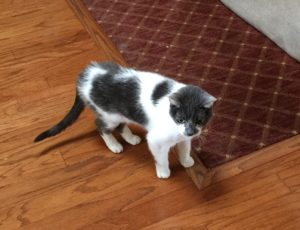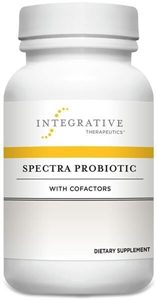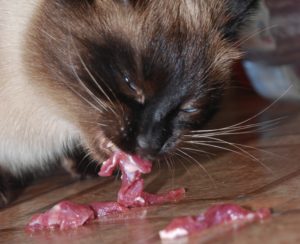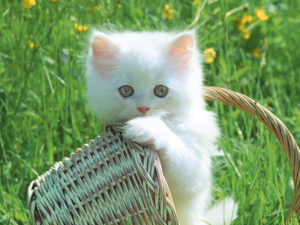Feline IBD Battle
The Phone Call – Learning why your cat just won’t eat
This past week I got a text from my aunt. Her cat, Allie, of seventeen and a half years went to the vet because she was losing weight and despite being hungry, she would sniff the food and turn away. To make matters worse she would throw up clear liquid for no apparent reason. Clearly there was some kind of intestinal and digestive issue going on. The vet described it as a disease where the small intestinal walls start to thicken and harden. Allie was given prednisone and B12 shots which helped her appetite, but the effects would only last a couple of weeks. My aunt asked me if I had any suggestions on how to get her to eat. I had never heard of such a disease, so I immediately stopped everything and sent her all my best tips.
Tips for getting your cat to eat

Allie
- Gerber baby food meats
- Digestive enzymes
- Probiotics
- Taurine, if Allie would be fed home-cooked meals and baby food
I used Allie’s picture to muscle test for several possible products options, and found the best options for her: Pet Alive’s Pancreas Booster and Integrative Therapeutics’ Spectra Probiotic and Similase. Taurine is a type of amino acid that cats have to get from their diet because their bodies don’t produce it. It’s found in meat, but the cooking process destroys it; therefore, adding it as a supplement is required.
 The Disease
The Disease
I really wanted to understand better the disease Allie’s vet described, so I did a little research on Dr. Karen Becker’s/Mercola Healthy Pets website. It’s highly likely that Allie has inflammatory bowel disease or lymphoma. Both of these diseases exhibit the same symptoms she displays, including the description of the intestinal walls thickening.
According to Dr. Becker, feline inflammatory bowel disease develops when the villi in the small intestine lose their individual finger-like shape and become flat, shortened, and fused together. This change dramatically reduces the amount of enterocyte cells available for nutrient absorption. In addition, inflammatory material fills in the crevices between villi and flattens the gut walls. The intestinal mucosal lining becomes injured and weakened through this process, increasing its permeability and allowing toxins (partially digested proteins and allergens) from the gut to leak into the bloodstream. This is a condition known as dysbiosis, or leaky gut.
Symptoms of feline IBD include chronic vomiting, diarrhea, and malabsorption of nutrients. Left untreated these can lead to allergies, auto-immune disease and even lymphoma.
The Usual Suspect
Dr. Becker suspects that the most likely cause of feline IBD is the commercial, highly processed diet cats are fed–mainly kibble.
The vast majority of affordable commercial cat food is grain-based. The digestive tracts of cats, who are obligate carnivores, are not designed to process grain. It’s reasonable to think a decade or so of eating a biologically inappropriate diet containing a host of GMOs (genetically modified organisms) might cause serious digestive disease. In addition, most commercial pet foods contain a long list of additives and preservatives, not to mention the potentially toxic changes that take place in the actual food ingredients during processing. It’s entirely possible some of the chemicals present in processed cat food cause degenerative changes in the feline digestive tract over time.
Cat Food and Diet as a Medicine?
Perhaps you’ve heard the expression “Let food be thy medicine and medicine be thy food” by Hippocrates? I think it’s very fitting not only for people but pets, too! Cats are meat-eaters by nature; therefore, their diet needs to include high quality, species appropriate food, preferably raw, that is easily absorbed and digested. When this recipe is followed the result is a healthy, vibrant, and beautiful cat. Even if you’ve fed your cat dry kibble for years, commit today to start making your cat healthier by giving her the kind of diet she was designed to eat. Health conditions, illnesses and diseases may slowly disappear, too, as you improve her health from the inside out. Diabetes, cancer, inflammation, and allergies are just a few of the diseases that can cured just from following a species appropriate diet. As crazy as that sounds, it’s true! May your refrigerator become your new medicine cabinet! A high quality probiotic added to your cat’s diet will help heal and rebuild her good gut bacteria is essential for cats with IBD. “The entire length of your pet’s digestive tract, when healthy, is coated with a good balance of bacteria that protects against foreign invaders, undigested food particles, toxins and parasites. Friendly gut bacteria serves as a natural antibiotic and also contains anti-fungal and anti-viral properties. It also promotes appropriate immune response to invaders.”
Slow progress
My aunt says that Allie has been eating her baby food along with some special milk formula for cats, but she’s also figured out that there’s more in it than just meat. 😱 In order to “sneak” in her supplements my aunt mixes them in chicken broth (I also recommended bone broth) and squirts it in her mouth with a syringe. Our fingers are crossed that Allie’s body will respond well to the supplements and she’ll be able to increase her food intake. One thing is for sure: this precious girl is so loved and her “parents” will go to the moon and back for her during the time they have left.
More on Feline Irritable Bowel Disease.
You can read more about this disease in these two articles:
http://healthypets.mercola.com/sites/healthypets/archive/2014/03/31/cat-chronic-vomiting.aspx
http://healthypets.mercola.com/sites/healthypets/archive/2012/06/01/feline-ibd-symptoms.aspx


